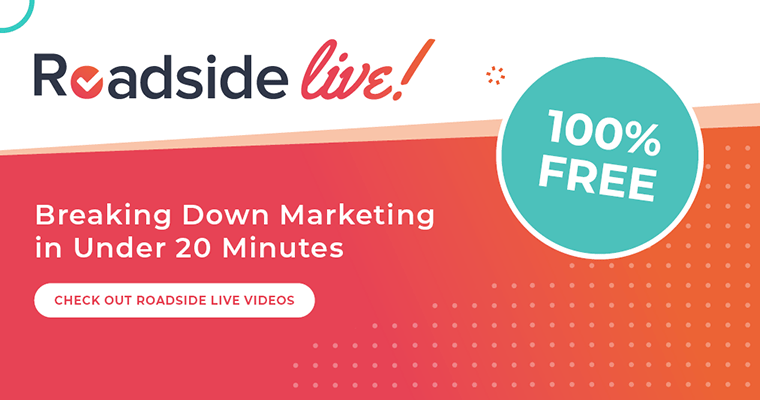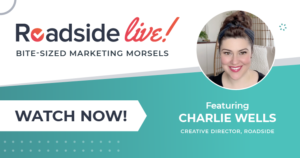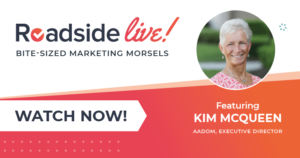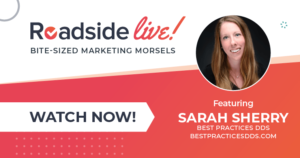How to Buy a Practice the Right Way [VIDEO]
Contrary to what you might assume:
COVID-19 hasn’t put a halt to the buying and selling of dental practices.
If anything:
It’s increased significantly, making the market more competitive than ever.
So, if you’re considering buying a dental practice (whether it’s soon or a few years out), this Roadside Live… This text opens a new tab to our Facebook for Roadside Live… is for you!
Angela and Michael Dinsio, Founder of Next Level Consultants… This text opens a new tab to the company’s website…, discuss how to buy a practice the right way, including:
- Why dentists are selling during the pandemic
- 3 things you need to do before buying
- How your relationships and networking help you
- Potential pitfalls when buying a practice
Angela: Well, hello again, everybody. Thank you for another live today. Today, I am joined with a special guest, it’s Michael, with Next Level Consultants, and we are so excited that you’re able to join us today.
I’m just going to quickly introduce you to our group, and then let’s dig right in after we do our intros about some great information I think a lot of our audience is going to love to hear about how to buy a practice. That’s a little bit different subject, but there’s a lot of it going around.
So just to do a little bio on who my guest is today:
At Next Level Consulting, Michael spent six years representing one of the largest financial institutions from Alaska to Colorado prior to founding Next Level and guided more than 220 startup offices and 200 practice transitions and that amount of time, which is quite a journey. And he really found that his passion was to help dentists navigate that process.
There’s a lot of complexity of launching and purchasing dental practices, and they needed a lot of support. And he really recognized a hole in the marketplace when it came to management consulting.
So, you know, as corporate dentistry and DSOs continue to find success, the poor practice owners were finding challenges in growing and thriving their individual practices. So with that in mind, he started Next Level Consultants. It’s a premier practice management organization that helps independent dentists with ownership, guiding them through the very challenging process of practice acquisition and getting it off the ground rolling, advises them at all stages, establishing a new practice, maintaining, expanding the practice, or preparing to sell if they’re at that stage of the business.
And after having analyzed thousands of cashflow business models, he’s very qualified to be speaking on this as a business strategist advisor to healthcare professionals. He knows what he’s talking about. I’m really excited to hear more about his expertise and give our practices some advice here.
He works with owners and their teams to really clarify their priorities, their procedures, get more accountability, and get everyone from the dentist, the hygienist to the front office, really blending their skills together and motivating the team to find success as a group.
Based on this reputation in the region, we were so happy that he was joining us. Several top dental schools have requested his expertise as represents for their students. And we’re so happy to have partnered with him and work with him together. He really enjoys helping practices find that success. he’s got the passion and commitment to helping them be successful.
So with all of that, we definitely have the qualifications. I’m really excited to talk to you. I was, just before we went live, mentioning that we did a little bit of our own research. And generally, you know, we’ve been in business for 21 years, and we usually see about, I would say, you know, 1 to 2% of our marketing doctors attrition, they sell their practices and retire about every year.
I did some little quick math for 2020, and we had between 5 and 10% of our marketing clients sell their practices after COVID, after they started reopening, which I was shocked that there was that many, but there a lot of our doctors that had been considering retirement – maybe had an associated in there or considered an associate – and some of the stresses of the pandemic, and they’re just like, let’s someone= else do this. It’s finally time to step away and let the young guys take over the practices.
So you know, 10% was quite a big change. So I’m sure you’ve seen that in this year too. Are you seeing a lot more activity with buying practices and things like that?
Michael: Angela was, it was. And by the way, thank you so much for having me on, and it’s a pleasure to be a part of your program. I love what you guys are doing. And thanks to that.
That was the best intro ever. So thank you. I feel bad. I gave you a big bio, and I wanted you to take what you wanted, but you, you went to the whole thing, and I love that.
Thank you. I appreciate it. It makes me feel kind of old, but you know, big picture:
Yeah, I saw tons of practices transition. It was the COVID environment that I think pushed a lot of sellers into that gear of selling, and the funny thing about that, though, Angela was, I noticed that a lot of buyers, I didn’t think buyers were going to jump into the market because they were afraid of owning a practice through the COVID nonsense. But actually, they jumped in with both feet because they felt like their hours got cut, and they didn’t have control of the practice. Some of them were doing hygiene. And so they’re like, you know, I don’t want to do this. I want to; I need to take control of my own career and stop relying on the associate position.
So yeah, I saw a lot of activity for sure.
Angela: Yeah, we have a few new practices that had started with us in 2020 that that’s exactly the feedback I got from the providers was that they were an associate and a practice. And when the closure hit, because they were an associate or they were one of several associates and maybe the low man on the hierarchy there, they got their hours cut first, or they were the last ones to return, and they’re like, I need more ownership my own practice. I need to have more control over my own income, my own destiny as it is. So that’s kind of the feedback I got from a lot of the new practices that we’re working with is that they didn’t want someone else telling them they couldn’t work because they host too many providers. And there were some scary times in the spring of 2020 here. We’re hoping we’re not going to get a rinse and repeat in 2021, but we’re going to move on.
Michael: Yeah. Let’s not jinx it. And move on.
Angela: Let’s talk a little bit about buying a dental practice.
How would you advise someone who’s interested in buying a practice? What are the first steps they should look at to purchasing a new practice or really going out on their own?
Michael: Yeah. I talked to a lot of buyers over the years, and I have found that there are really three things that they need to do before entering into the scene of finding the right practice.
And you know, big picture, you know, not just to stay generalized here, but it really is true. You got to know where you will want to practice. Too often, I find buyers that they just kind of want to look everywhere because they’re looking for the best opportunity or maybe for the practice that’s spinning off the most cash, you know they’re very business-focused, maybe money-driven, which is totally fine – that’s what we’re doing here. We’re trying to make money.
But if someone’s too broad about where they want to practice and we start looking at practices, they find that practice that might be in an urban setting or maybe a rural setting, we start getting into negotiations, and they start getting cold feet. They’re like, I don’t want to live in the middle of the boondocks. Right. And so really know where you want to be. Of course, you got to think about your non-compete.
But you know, get clear about the type of practice you want to have, where you want to live, where you want to settle, where you want to raise a family, all that good stuff.
So that’s the obvious first step.
The second step, I would say, is just to have a conversation with a lender. The lender really can’t do anything with you until you bring them a practice. I was a lender, like you said, for many, many years. And you really do want to see if you can get qualified in the first place.
Lending has changed quite a bit since COVID. I can say some generalized statements about what lenders are looking for today. But it’s changed since COVID, so you do want to talk to them and just, you know, see what they’re looking for before they lend you some money. That’s step two, in my opinion.
And then step three is really getting on the market or start hunting for practices. And you can do that a few different ways.
The most common way, of course, is reaching out to all the practice brokers.
And by the way, a little pro tip here:
You don’t just want to talk to the brokers. You really do want to be their best friend because most of these practices are selling before they even get to the broker’s website.
And the only way to get in a position to find a practice before it goes to the website is to be best friends with that broker. And there’s usually, you know, three, depending on the market, you’re in 3 to 10 brokers in one market.
And don’t forget those brokers that only do a few deals a year because they have good practices too. Of course, everybody knows the brokers that have 15 to 20 listings to send you. But you need to be talking to all of them because you just never know where, where that one practice that fits you perfectly is going to come from.
So brokers are the obvious step, but also get involved with your community, your association, talk to your friends, talk to folks like me, CPAs attorneys, you name it because – Patterson Schein reps, right – you just never know where you’re going to find that opportunity.
Think outside the box and just kinda go grassroots with it to try to find that practice.
So yeah, those are the first three steps: location, banking, and then, you know, approach the brokers and community leaders in the industry.
Angela: Right. And I think you answered this pretty well, but let’s just talk for a second more on the best ways to find that practice to buy.
So you mentioned a lot of those, but I really liked your point there of grassroots. I know that one of the practices, that was one of our clients, that sold, the doctor who was introducing me to the new provider said that she was considering selling and someone approached her because she had told, you know, a colleague and basically word of mouth.
Her buyer came to her before she ever even got to the process of officially putting it on the market. So what you’re saying is kind of grassroots, going back to relationship building is not dead in 2021. That’s still something that’s important.
So do you have any additional kind of tips other than obviously the brokers are, the agencies are the no-brainers. Everyone can find those, but what are some grassroots relationship tips that you might recommend they do also to either find or if they’re selling to get the word out?
Michael: Yeah, Angela, I would say the best practices come from your connections. It really is who you know, not what you know, and I love that you said that in 2020 relationships matter. They really do matter in this case.
Of course, talk to the brokers, be calling them very regularly, emailing them; they need to know your name. Okay. So, so that’s the brokers.
You don’t want to earn the reputation of a tire kicker or someone that’s looking for the unicorn practice, which oftentimes the brokers can kind of pigeon hole people to that reputation. I think buyers can get misunderstood really quickly, but that being said, you know, this statistic holds true: 50% of acquisitions happen outside of a practice broker.
They call them FSBOs – for sale by owners. So FSBOs are 50% of the market. And how do you find FSBOs?
Well, you talk to CPAs; they have relationships like you guys have relationships with clients, and it’s whoever is having conversations with older doctors that are in the twilight years of their career. Those people are in a place of influence with those particular doctors, consultants like myself. We know of doctors that are contemplating, and they find you, Mr. Buyer or Ms. Buyer, that is the perfect fit.
In fact, Angela, you and I had an opportunity together with one of our clients. She wasn’t ready to sell, but she found that perfect buyer, and she went ahead and moved forward with the acquisition because guess what? You might not find that buyer again.
And so again, those relationships are so important. You could always, another approach tip, could always do a direct mail actually handwriting folks in the area that you want to buy, and saying, “Hey, I’m a young dentist. I’m thinking about buying a practice. Here are my qualifications. Picture. Here’s what I look like.” Right? Like it’s a way to reach out and do a handshake without really knowing somebody. And I’ve found a lot of success there too.
So, I guess the natural way is the practice brokers, but the network, doing mailers, associations – when they’re doing their, kind of difficult with COVID, where they used to gather, you know, on a monthly basis you know – start networking. Those that network the best always find opportunities. That’s just how it goes.
Angela: I think that’s great. And some of the feedback that, you know, obviously it depends on the practice, but like you mentioned, some of those providers who are considering selling and have had their established practice for years, they are towards the end of their career, you know, some of them are interested in going through a broker and just settling their practice. But I know that a lot of them that I’ve personally spoken to are really looking for the right fit because they have such a relationship with their patients, and they are not just going to sell to someone who can write a check. They want the connection on an emotional and a values level before they’d even consider selling to them.
So I know that at least some of the practices that we work with, and we do work with maybe a few more of the custom type practices, but still, they want the right fit to take care of their patients because they built this for so long.
Michael: Yeah.
Angela: So tell me, what are some of the pitfalls that you see? Can you give any warnings of how someone can maybe avoid the top three pitfalls in buying a practice or taking over a new practice?
Michael: Yeah, that’s a great question. Thanks for asking. With that question, my brain’s kind of sparking on a hundred different things that we’ve been fortunate enough. We were a part of 27 deals last year. And I’m kind of summarizing just kind of the things that we experienced in those deals. And I guess if I were to pinpoint the top three, it’s difficult to do.
The first one would probably be don’t get over your head clinically. You know, as a buyer’s agent or someone that helps buyers transition, I’m looking at numbers, I’m looking at the strategy. I’m looking at potential landmines from a business perspective. But what I can’t do, what your CPA can’t do, what your attorney can’t do, your banker, your team, what your team can’t do for you, is they can’t tell you if you’re going to get into some trouble here clinically. Right. And I can’t tell a dentist if they can handle endo or if they can handle…
So really pay attention to the clinical part, because we’ve been a part of some transitions where, you know, the seller was a little bit more aggressive than the buyer. And so, all of a sudden, I did all of the number projections and the cash flow. And I did my job, but when the doctor went in, the production went down, and how was I supposed to know if their speed was fast enough or if they could do implants or not do implants.
And so, you know, that’s something that your team, you, me, attorneys, we can’t do that. You have to do that. Right.
And so that chart audit is very, very important that night, that one night that you get to go into the computer, look at the schedule, look at the charts, read the notes, look at the x-rays, and really decide if you and that seller are a fit clinically. Because the numbers could be great, but clinically it might not be. So that’s probably pitfall number one, that none of your team can help you avoid.
Number two, in this environment, I already alluded to this earlier, Angela, like the banks are being a little bit tighter on the money. And so, one of the pitfalls that I’m thinking of is under capitalizing the deal.
And what I mean by under capitalizing is if they don’t give you enough money, they as the bankers, then you might not have enough money in working capital for marketing, for hiring maybe an additional team member that you might need. And a lot of transitions, we needed a hygienist. Hygienists are going for top dollar these days, right?
If that wasn’t factored into the cash flow, you’re going to need extra money. Marketing is a big thing. You know, a lot of these older docs, they as you know, they weren’t doing the things they needed to do to grow. They were just kind of hanging out, and the buyer can’t afford to do that. They have a loan now.
And so growth is a big thing that they need to think about when buying a practice. A very good loan that gives them enough money to A. buy the practice, but B. have enough money to propel you into success post-close. So that’s probably number two, undercapitalization.
And then probably the third thing, it’s probably another one of my favorites, is there are so many books and podcasts and influencers in the market that talk about, don’t make the team mad, make them love, make them hug you. And you know, it’s a big kumbaya type moment, and it is, it’s very important. You don’t want to upset the front office gal because she could leave you. And that’s goodwill, right? Hygienist, that’s goodwill. You don’t want to upset the apple cart.
So you go into that transition thinking, “Oh, I want everybody’s got to love me, right?” Well, that’s a pitfall in itself because if you don’t, there’s a way of being very nice, but at the same time, you have to be the leader of the practice. They can’t jump all over. You have to take ownership, and you have to be a leader, but at the same time, you got to get them to like you. And there’s a balance there.
I’ve seen too many transitions where people go in and they just let their team run all over them. They’re calling the shots, and that’s not a good way to start a business relationship with your team. They’re still expecting you to be the leader. They’re still expecting you to be the clinical leader and the owner.
But at the same time, you gotta be nice, and you can’t be that dictator, but you gotta say, “Hey, this is our clinical philosophy. This is the way our schedule is going to look” You know, and they will follow you. So don’t be afraid of planting and sharing your vision with the team. And leading them. It’s different than what they were used to.
You might lose some people I know, but I will tell you that the majority of them will follow you. They’ll be excited about the next step of the practice. It’s okay to lose some people if they’re not on board with your vision. In fact, in a lot of ways, sometimes that’s actually pretty healthy because you’re turning the leaf. You don’t want to lose the whole team.
So I guess those would be my three things, you know, don’t get over your head clinically, don’t under capitalize the deal, get the right loan structure, and be prepared to be a leader, not a follower, day one. I guess those would be my three.
Angela: Those are great. And especially that team part, I can see the challenge of that, because that is kind of a tight rope because you don’t want to replace the entire team and have the patients, you know, lose patient retention because they’re too upset by everyone is gone, but you also don’t want to walk in and just be a doormat and have the team do status quo, because that is why the provider sold. I mean, it was something that made them decide that it was no longer financially profitable for them, and they sold.
So I am sure that is a fine line you’re walking there. So what I’m hearing is you want to meet the kids before you continue to date the parent to some degree too. Huh?
Michael: Ha, beautiful. That’s right.
Angela: Get in the office a little bit and meet the whole team before you sign on the bottom line.
Michael: That’s exactly right.
Angela: But I think that’s great feedback. You know, a lot of our audience are practices that obviously have a practice, but a lot of them are the associates who are starting to think about when’s it time for me to have my own practice.
And then, like I said, we had a handful, enough of our clients, who were in that demographic that they’re like it’s time to let the new guys take over, and it’s time for me to go and enjoy my lockdown in my own solitude. So we have an audience that is doing the transition on both ends, both building their own practices and maybe letting theirs go to some degree.
So I appreciate you taking the time to help us and kind of guide them through that. We’re going to make sure we have your contact information up for any of the listeners out there who either, you know, are the providers who are looking to start a new practice, or maybe even the clinical staff that have heard the associates in your practice or other colleagues say that so-and-so is going to be looking to buy a practice. We’ll put your information out so they can get some expert guidance during the process, because just those three pitfalls you mentioned, there’s a lot of things to consider. It’s not for the faint of heart, so they have to be able to really have everything lined up and be prepared for success if they want it to be successful.
Michael: That’s right.
Angela: We really appreciate your time today. I loved having you on and think it was a great discussion. And thank you so much for joining us today.
Michael: It was a ton of fun. And thank you guys for putting this program on. I think doctors need as many resources as possible, and you guys are a great organization, and I’m proud to be a part of it. Thank you.
Angela: Thank you. We’ll talk to you soon. Take care.
Meet the guest
 Prior to founding Next Level Consultants… This text opens a new tab to the company’s website…, Michael Dinsio spent six years representing one of the nation’s largest financial institutions in a territory stretching from Alaska to Colorado.
Prior to founding Next Level Consultants… This text opens a new tab to the company’s website…, Michael Dinsio spent six years representing one of the nation’s largest financial institutions in a territory stretching from Alaska to Colorado.
In that time, he guided more than 220 dental office start-ups and facilitated 200 practice transitions. Through this journey, Michael found that his passion was helping dentists navigate the complex process of launching or purchasing a dental practice.
Along the way, he recognized a hole in the marketplace when it came to practice management consulting. As corporate dentistry and regional DSOs continue to find success, today’s generation of practice owners face new challenges to grow their businesses and thrive. With that goal in mind, Michael followed his true passion and started Next Level Consultants.
Next Level is a premiere practice management organization that helps independent doctors nationwide get into ownership with the goal of being expert business people.
Michael advises clients in all stages of their practice – whether it is establishing a new business, maintaining and/or expanding a practice, or preparing to sell. Having analyzed thousands of cash flow and business models, Michael is qualified to serve as a key business strategist and advisor for any healthcare professional. Now, as the founder of Next Level Consultants, Michael works with owners and their teams to clarify their priorities, implement procedures and create accountability. Working with everyone from the dentist, to the hygienists, to the front desk staff, his unique blend of skills and insights inspire and motivate teams to reach their goals.
Based on his excellent reputation in the region, several top dental schools have requested Michael’s expertise for annual guest presentations for their students. These include the University of Washington School of Dentistry… This text opens a new tab to the UW dental school website…, Oregon Health & Science University… This text opens a new tab to the OHSU website…, and the University of Colorado School of Dental Medicine… This text opens a new tab to the University of Colorado’S dental school website….
Michael gains great satisfaction in helping healthcare professionals reach their greatest potential. Passionate and committed, he brings his dedication to helping doctors and their teams turn their dreams into realities every day.
A Midwest native, Michael has lived in the Pacific Northwest for over a decade. He resides in Tacoma with his wife and two young children. In between chasing toddlers and taking client phone calls, he enjoys golfing and rooting for The Ohio State University… This text opens a new tab to The Ohio State University’s website… football team.




